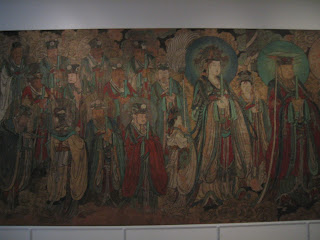When I started this new blog, I intended to explicitly avoid commenting on cultural matters as I had in the past.
However, as this blog takes its name from a well-known CBC radio program, the recent transformation of CBC Radio Two into something very different from the radio station I grew up listening to deserves some token comments.
Do not get me wrong- this is not going to be a wistful recollection of how wonderful it was to have a radio station that appeared to have been fashioned solely for
my own personal enjoyment. This was a wonderful thing, but I’m happy to accept that things change.
Indeed, many of the comments to the change (mine included) can be boiled down to something along these lines – CBC Radio Two (or CBC FM as is used to be called) – “The music Radio Two had on was the music I liked, and now there’s less of it, so this is a bad decision.”
Well, no. That’s not really fair, because the usual, and in this case, plausible counter argument appears: “Well, why should we taxpayers be supporting just your tastes – shouldn’t a publicly funded broadcaster try to reach out to as many people as possible?” (Indeed, you can see this very conversation occurring over on the
Globe and Mail’s website, where comments are being posted to their article on the CBC’s change.)
Well……yes. I really hate to admit this, because it goes against my own patently elitist, snobby, stuffy interests (all these descriptions are predicated of classical music) but this argument has some teeth. It isn’t plausible to argue that in its role as a public broadcaster, the CBC should cater to the tastes of only a particular category of music listener.
So in this sense, CBC Radio Two’s shift away from a primarily classical repertoire isn’t a bad thing. Indeed, if one looks at just how fundamental the
genre is to the dissemination of music, it’s downright revolutionary, a vast extension of a program they have been toying with for years now. As a public broadcaster, they have little choice but to reflect the tastes of as many Canadians as possible.
My primary concern is that have almost entirely given up on
leading or directing musical tastes. The problem with this is that it appears to follow from how we see music as an art form.
By way of contrast, consider the case of CBC's mainly talk radio station, Radio One. while I've endured more debates around the elitism of classical music than I care to admit, I've never heard anyone argues that this station, Radio One, is elitist or snobbish. A show like
Ideas has no problem exploring a variety of intellectual pursuits and topics. Indeed, many would hold Radio One as the only thing CBC does right.
Why? Well, when people go and listen to Radio One, they expect to learn something, or to be informed. There are no genres on Radio One, just information to be communicated.
So why does CBC Radio Two with its emphasis on classical music come under fire? Or put more generally, why is our
common discourse around classical music framed in this way, around stuffiness and snobbiness, around elitism and dry intellectualism?
Perhaps it has something to do with the notion that genres are the aesthetic counterpart to Aristotle’s declaration of substance as species and that moreover, musical genres are not something one likes or dislikes, but instead pledge an aesthetic allegiance to, and classical music listeners are the ultimate chummy old boys club.
***
Perhaps looking at classical music this way helps to explain why CBC Radio Two is doing what is does and also explains why classical musicians and classical music lovers make fairly baffling comments around the state of classical music.
Alex Ross in a recent
post links to an
interview with Joshua Roman, who heads up the Seattle Symphony's cello section.
He says, in response to the question "Classical music was marketed for snob appeal for decades, but now it's keeping people away."
"I would love to see the classical-music industry
crumble, just absolutely fall to bits. Because I think then we'd have to start over. We'd have to say, well, what is it? What is classical music? Is it this concert hall, is it these tuxedos? No, it's this music."
Sure, but....firstly was classical music really marketed for snobs? And is it really keeping away? Oh, and haven't people been saying exactly the same thing since the 1960s?
Is this really the
problem with Classical Music?
This is what baffles me. We classical musicians secretly wish that the industry would die around us. But then, why haven't we killed it - most classical musicians I know are either self-employed, or could quite easily, along with their colleagues, get up and kill every symphony orchestra and opera house in the country, and start their own organizations.
Is it really the tuxedos and rich people keeping everyone from dropping their pop albums and buying tickets to the opera? If only people listened to the
music?
Let me suggest that the hostility towards classical music isn't really grounded in the snobbishness or elitism, nor is it an anti-intellectual stance, (an aside - has anyone ever noticed how many prominent writers, the most common class of “intellectual”, don't like classical music?).
So what's it grounded in? Uh, I don't know, and I've staggered far from home.
***
So after all this rambling, am I any closer to understanding what's going on with CBC Radio Two, beyond the simple economics of having only two radio stations? If we had three stations, it would be much easier to have a solid block of cultural programming a la BBC3, but we don't, so we're stuck with a dyad that often alienates more than it inspires.
While I appreciate their motivations, I am still saddened by the sheer lack of
talk about culture on CBC anymore. When I grew up, you could actually learn something about classical music and other arts on CBC, every day. And it wasn't restricted to classical music - I fondly recall a Saturday evening spent learning all about the metal power ballad, its origins and development.
That seems much less likely these days. There are fewer musicologists, fewer composers, yet unsurprisingly enough, more performer interviews.
For example, with the cancellation of Two New Hours, contemporary classical no longer has a dedicated home, and although I know Laurie Brown will do a great job with her new show, I simply can't imagine she'll have the breadth and depth of knowledge Larry Lake had. They folks there are there to spin records, not to teach, nor to raise.
This is what CBC has slowly been strapping from the branches of its cultural mandate. It's not the music, it's the conversation. Like their TV station, instead of offering a place where people could go and regularly expect to learn something, it has become a place for Canadians to watch sitcoms and curling.
So there are a number of disparate threads - the categorization of music, and how we as individuals come to identify with the "ideal listener" of the genre we happen to subscribe to, and Canada's unique cultural conditions.
Here's the rub. I'm listening to the
Early Music Show on BBC, on the Internet - Bach Cello Suites! This show is an exemplar of what the kind of intellectually serious and accessible work the CBC used to do.
So given the cultural delicacies out there and available on my computer, as much as I'd like to keep things local, there just doesn't seem to be room for people like me on a radio station I once considered an essential part of Canada's cultural life.
At least I feel I appreciate the predicament they're in, despite the fact that it also means that I will listen to it even less than I do now.
























